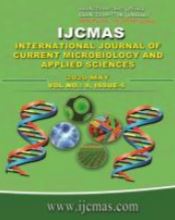


 National Academy of Agricultural Sciences (NAAS)
National Academy of Agricultural Sciences (NAAS)

|
PRINT ISSN : 2319-7692
Online ISSN : 2319-7706 Issues : 12 per year Publisher : Excellent Publishers Email : editorijcmas@gmail.com / submit@ijcmas.com Editor-in-chief: Dr.M.Prakash Index Copernicus ICV 2018: 95.39 NAAS RATING 2020: 5.38 |
The study measured and compared quality parameters such as pH, moisture content, ash content and hydrogen peroxide concentration of three types of honey from different localities in Ghana. Using the agar well diffusion, antimicrobial potential of natural honey from two different sources as well as an adulterated honey were determined against Staphylococcus aureus (ATCC 25923), Escherichia coli(ATCC 35218)and Klebsiella pneumonia (ATCC 27736). The results of the physico-chemical properties showed the following range of values; pH of (3.68– 4.49), moisture content (17.20 – 22.42%) and ash content (0.09 – 0.48%). The moisture content of the adulterated samples at 25% and 50% concentration in all cases exceeded the recommended 21%of good quality honey. The findings also indicated that, natural honey (Koforidua and Berekum) has a higher antimicrobial activity against all the bacteria compared to the adulterated honey. The susceptibility of Escherichia coli, to the honey treatment, was significantly different (p=0.0383) from S. aureus and K. pneumoniae. However, when the susceptibility of S. aureus and K. pneumoniae, when compared was insignificant (p=0.6292).The adulteration of the honey could have caused some of the antibacterial factors in the honey to be lost or reduced to non-lethal amounts, hence losing it antimicrobial properties.
 |
 |
 |
 |
 |